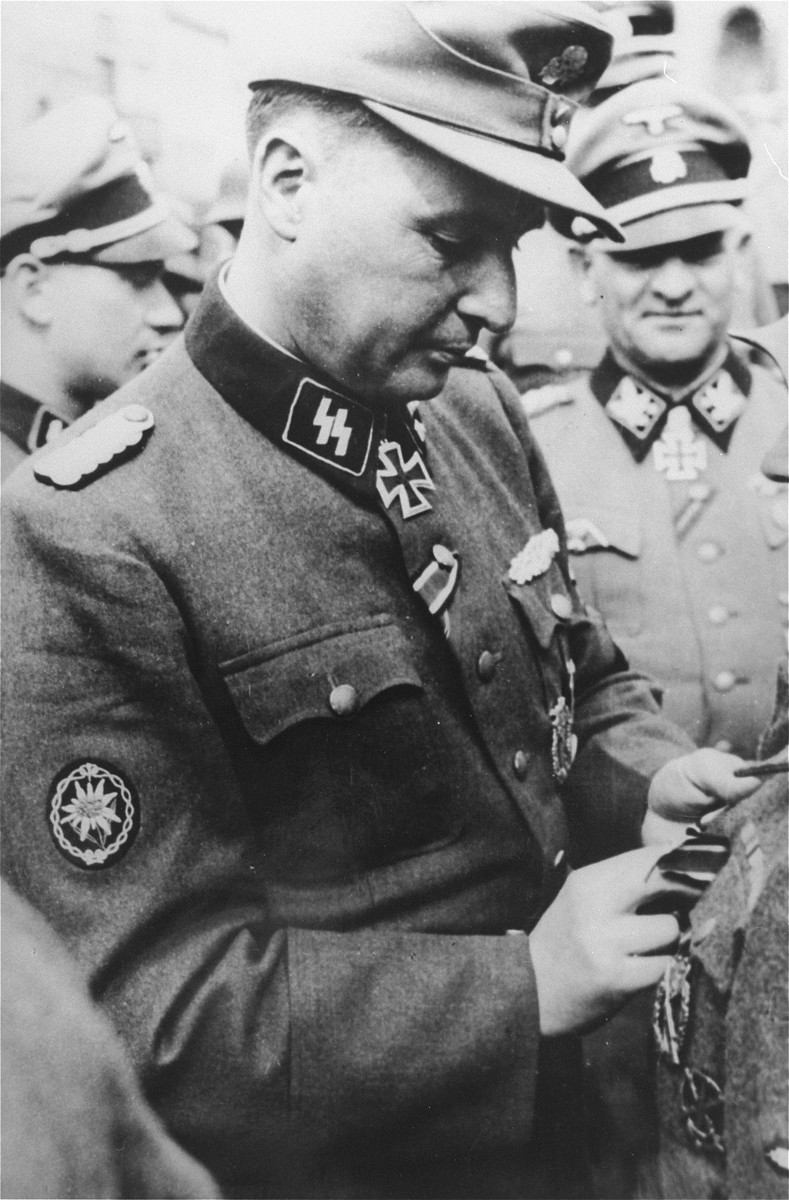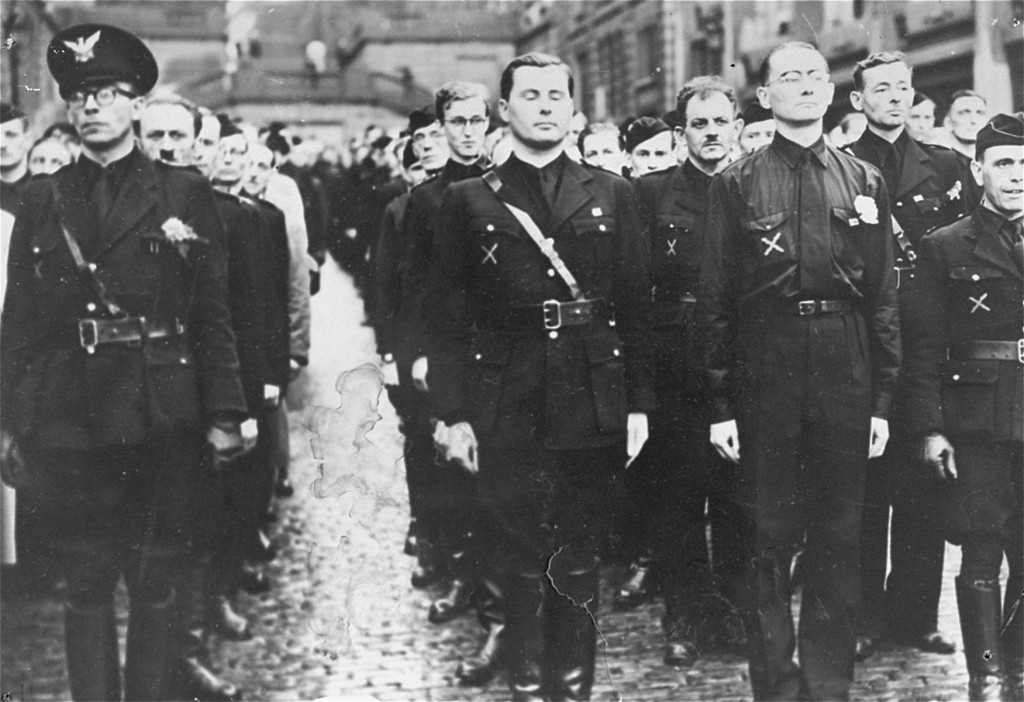Léon Degrelle
Léon Degrelle was an extreme right-wing Belgian politician and Nazi collaborator. During World War II, he founded a collaborationist military force that fought on the eastern front. Degrelle escaped to Spain at the end of the war, where he continued to spread pro-Nazi propaganda for decades.
Early Career

Léon Degrelle began his political career in the youth movement of the Belgian Catholic Church. He grew up in a French-speaking Catholic family in the southern Belgian region of Wallonia. Degrelle became active in journalism while he was a student at the University of Louvain in the 1920s. When he was 24 years old, he became the head of a Catholic publishing house called Christus Rex (Christ the King). Under Degrelle’s leadership, Christus Rex published magazines, cheap novels, and pamphlets on current events. It began publishing more political materials in the early 1930s. Degrelle also began to speak at public meetings.
Rex and Belgian Politics in the 1930s
Christus Rex started as a publishing house, but it quickly became a radical right-wing Catholic political movement—known simply as Rex. At first, Rex was a part of the Catholic Union, a major Belgian political party. In late 1935, however, Degrelle openly challenged and criticized the party’s leaders. As a result, Rex was forced to become its own independent political movement. Rexists offered few specific policies. However, they presented themselves as a right-wing, nationalist, authoritarian party united around family, Catholicism, and the Belgian monarchy.
Degrelle became a charismatic public speaker. Rex achieved unexpected success in the 1936 Belgian national elections, winning over 11 percent of the popular vote. These were significant gains for a new political party. Over the next several months, Degrelle and the Rexist movement tried to build on their sudden success. They organized new local branches into a national network and promoted themselves as a strong anti-communist party. However, Rex could not keep its early momentum.
Degrelle was partly responsible for his movement’s failure to exploit its early success. In October 1936, he organized a march on Brussels to demonstrate the strength and popularity of Rex. But few supporters were willing to defy the official ban on public demonstrations. The event ultimately backfired. It was embarrassingly small and led people to think of Rexists as radical lawbreakers.
Degrelle’s leadership also opened Rex to charges that the party was controlled by larger foreign powers like Nazi Germany and Fascist Italy. Rexists tried denying that they had foreign connections to other right-wing authoritarian movements in Europe. However, Degrelle traveled to Germany and Italy in 1936. He even met personally with Adolf Hitler in Berlin and began to receive limited financial support from Nazi Germany. Rex also received significant funding from Fascist Italy.
In 1937, Degrelle ran for office in Brussels. He was defeated by Prime Minister Paul van Zeeland. This defeat ended the young party’s early momentum and any chance of forming an alliance with mainstream Catholic politics. Rex would never regain its earlier popularity. As its popular support melted away in the late 1930s, Rex became more radically antidemocratic. The party began to more closely resemble other right-wing authoritarian movements.
Degrelle and other Rexists soon began to sympathize more openly with Nazi Germany. After World War II began, Degrelle blamed France and the United Kingdom for creating the conditions that he believed had forced Germany to invade its neighbors. He also blamed Jews and freemasons for supposedly conspiring to manipulate European countries into war. On May 10, 1940, German forces invaded Belgium and the Netherlands. That same day, Belgian authorities arrested Degrelle and many others whom they suspected would betray Belgium to Nazi Germany.
Collaboration with Nazi Germany
German forces advanced quickly, conquering Belgium in just over a week. In July 1940, Degrelle was released from detention. He began reorganizing Rex and met with German authorities. Degrelle dreamed of making himself the top figure in a Belgian collaborationist government. He convinced himself that he would soon be summoned to Berlin to meet with top Nazi leaders. But Degrelle had little support for these schemes among his fellow Belgians. Furthermore, German authorities had already begun working with other Belgian collaborators by the time that Degrelle was released from detention. Instead of creating a collaborationist Belgian state as Degrelle hoped, German authorities chose to rule occupied Belgium directly with the aid of local collaborators.
Degrelle continued to look for opportunities to draw Rex closer to Nazi Germany. His speeches began attacking Jews more viciously. In late 1940, Rexist forces committed several acts of antisemitic violence. In early 1941, Degrelle declared that Rex fully supported the German war effort and the Nazi project to reshape the map of Europe. For the first time, he ended a public speech with “Heil Hitler!” These developments reinforced many Belgians’ belief that Rex was little more than a violent extremist group of opportunistic collaborators.
Degrelle believed that participating directly in the German war effort would be the most effective way to win German support for Rex. He made several proposals to create Rexist military forces to fight for Nazi Germany in spring 1941. Degrelle did not manage to attract much support for these plans. The German attack on the Soviet Union in June 1941 finally provided Degrelle with an opportunity to help form an auxiliary military unit to fight for the Third Reich.
Degrelle wanted to create a multilingual Belgian legion. However, this idea conflicted with German plans for Belgium and the creation of a Dutch-speaking Flemish collaborationist force already underway. Instead, the German army created a French-speaking Belgian force known as the Walloon Legion. Degrelle believed that forming an auxiliary military force to participate in the war would secure Nazi support for a Rexist-led collaborationist Belgian state within German-dominated Europe.
In late July 1941, Degrelle announced that he would volunteer to serve in the Walloon Legion in order to encourage his supporters to join. Although the unit depended entirely on the German army for its existence, Degrelle tried to portray it as a Belgian nationalist force. Made up mostly of Rexist volunteers, the legion left Belgium in August 1941. The recruits trained in Germany before being sent to fight on the eastern front. By early 1942, the unit had already taken heavy losses.
Degrelle became convinced that the SS would be more powerful allies to Rex than the German army and began meeting with SS officials. He declared that the French-speaking Walloons had Germanic roots and would be an important part of a future Nazi empire. In May 1943, Degrelle met Heinrich Himmler. In June, the Walloon Legion was integrated into the SS, where it became the SS Walloon Volunteer Brigade (Sturmbrigade Wallonien).

Degrelle caused Rex to collaborate even more closely with Nazi Germany during the last years of World War II. Rex began to imitate the ideology and structure of the SS. Degrelle even received military decorations from Hitler. But Rex was increasingly unpopular in Belgium as it became a more enthusiastic collaborator of Nazi Germany. In late summer 1944, German forces withdrew suddenly from Belgium. Most Rexist collaborators decided to flee to Germany instead of facing the possibility of revenge killings or postwar justice. As Soviet forces advanced on Berlin in April 1945, Degrelle abandoned the Belgian legion fighting there and fled the country.
Postwar Life and Legacy
Degrelle was sentenced to death by the Belgian justice system for high treason. He managed to escape to Spain, which was led by the right-wing authoritarian government of Francisco Franco. Franco’s government was sympathetic to the Axis powers. Many Nazi war criminals and collaborators fled there after World War II. Degrelle obtained Spanish citizenship in 1954, which gave him legal protection from extradition and prosecution.
From Spain, Degrelle published numerous books of pro-Nazi propaganda. Degrelle also denied that the Holocaust ever happened. He claimed baselessly that the systematic genocide of European Jews during World War II was a hoax. Degrelle often exaggerated his own importance. He portrayed himself as a heroic anti-communist Belgian nationalist. He died in 1994.

